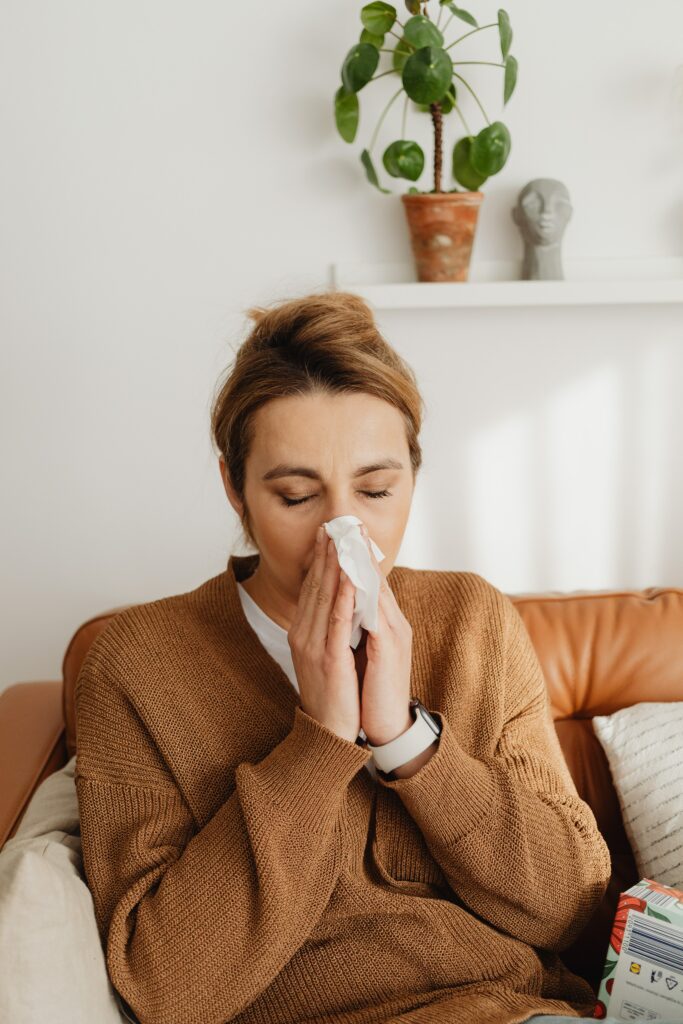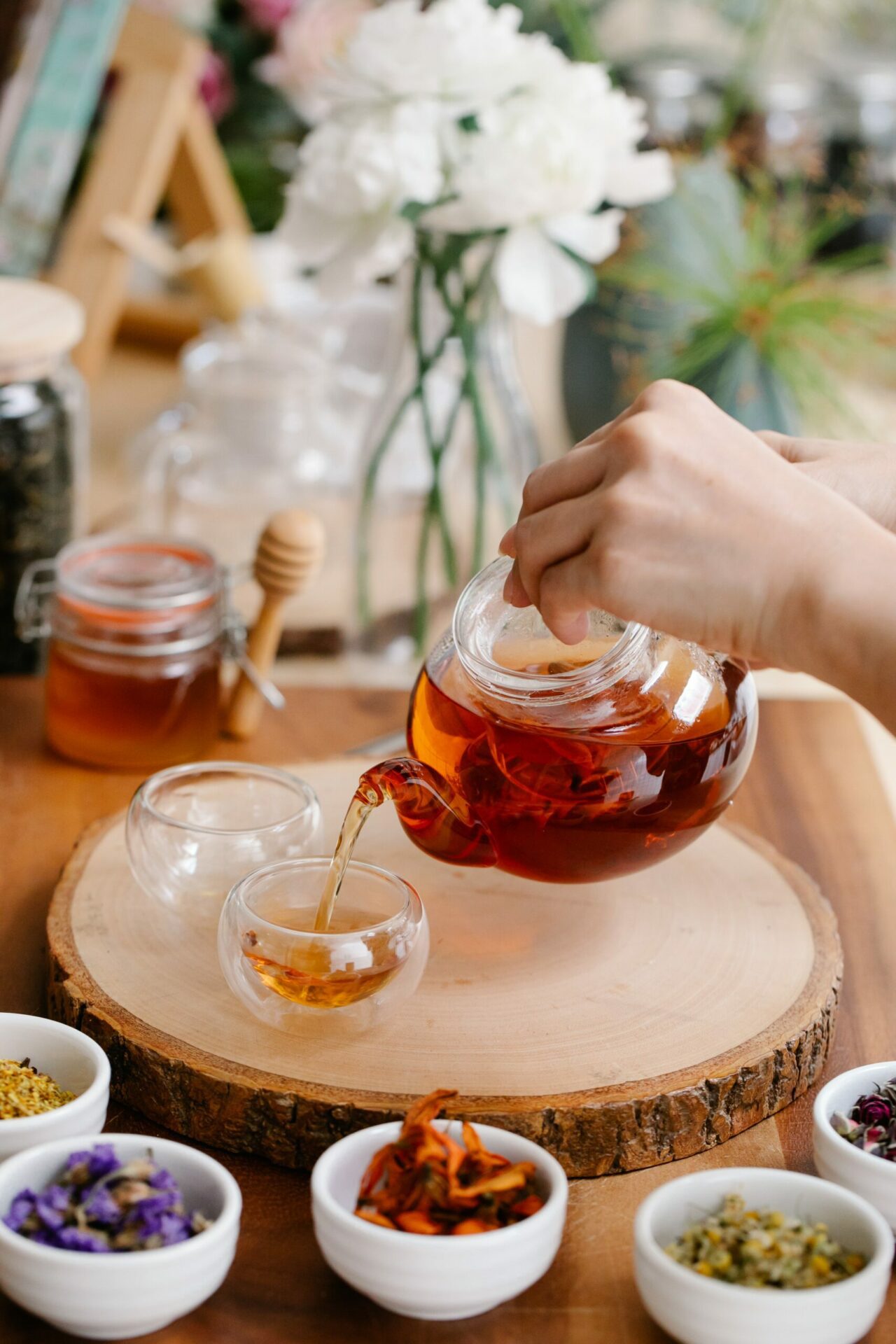Herbal Remedies for Sinus Congestion: Effective Natural Relief
Sinus congestion can be a frustrating and uncomfortable condition that affects a large number of people. Often caused by colds or viruses, this issue can lead to blocked and painful sinuses, making it difficult to breathe and causing discomfort throughout the day. While there are many over-the-counter medications available for sinus relief, some individuals may prefer a more natural approach to alleviate their symptoms.
Disclaimer: This article is provided for informational purposes only and should not replace professional medical advice. Please consult with a qualified healthcare practitioner or herbalist before using any herbal remedies.
Herbal remedies have been used for centuries to treat various ailments, including sinus congestion. These natural alternatives offer a gentle, yet effective way to help clear blocked nasal passages and reduce inflammation. By exploring different herbal options and learning how to use them properly, individuals can find a remedy that best suits their needs and allows them to breathe easier.

In this article, we will discuss a variety of herbal remedies that have been found to be beneficial for sinus congestion. From well-known options to lesser-known herbs, these remedies may provide relief and help improve overall sinus health. Keep reading to learn more about these natural treatments and how they can be incorporated into a daily routine to promote clear and healthy sinuses.
Understanding Sinus Congestion
Sinus congestion is a common condition affecting the nasal passages and respiratory system. This section will cover the symptoms of sinusitis, the differences between chronic sinusitis and allergic rhinitis, and the relationship between sinus pressure and nasal polyps.
Symptoms of Sinusitis
Sinusitis is an inflammation of the sinus cavities, often caused by an infection. When sinus congestion sets in, the mucus membranes within the nasal passages become swollen and irritated. Common symptoms of sinusitis include:
- Stuffy nose
- Runny nose
- Pain or pressure in the face, particularly around the cheekbones, nose, or forehead
- Decreased sense of smell and taste
- Fatigue
- Headache
- Fever
These symptoms can be quite uncomfortable and may affect a person’s overall well-being and daily activities.
Chronic Sinusitis vs. Allergic Rhinitis
Two common conditions related to sinus congestion are chronic sinusitis and allergic rhinitis. While both conditions share similar symptoms, including nasal congestion and a runny nose, they have different underlying causes.
Chronic sinusitis is a long-term inflammation of the sinus cavities, lasting 12 weeks or longer. It can be triggered by infections, structural abnormalities in the nasal passages, or immune system issues.
Allergic rhinitis is caused by an overreaction of the immune system to allergens, such as pollen, dust mites, or pet dander. This reaction causes inflammation in the nasal passages and sinus congestion.
In order to determine the most appropriate treatment, it is vital to determine whether sinus congestion results from chronic sinusitis or allergic rhinitis.

Sinus Pressure and Nasal Polyps
Nasal polyps are non-cancerous growths that can form on the lining of the nasal passages or sinuses. These polyps can contribute to sinus congestion and increase sinus pressure, leading to pain or discomfort. In some cases, nasal polyps may also obstruct the airflow through the nasal passages, making it difficult to breathe.
Treatment options for nasal polyps may include medication to reduce inflammation or surgery in more severe cases. Addressing nasal polyps and their underlying cause may help alleviate sinus congestion and improve overall respiratory health.
Causes of Sinus Congestion
Sinus congestion occurs when the nasal passages become inflamed or blocked, making it difficult to breathe and leading to discomfort. There are several factors that contribute to sinus congestion, including viral infections, bacterial infections, and allergic reactions.
Viral Infections
One common cause of sinus congestion is a viral infection, such as the common cold or flu. These infections can lead to inflammation in the nasal passages, making it difficult for the body to drain mucus effectively. This buildup of mucus results in sinus congestion, making it difficult to breathe and causing discomfort. The body’s immune system works to fight against viral infections, but the inflammation and congestion can persist until the virus is eliminated from the body.
Bacterial Infections
Similar to viral infections, bacterial infections can also cause sinus congestion. In some cases, a bacterial infection may occur alongside or after a viral infection, potentially exacerbating the symptoms and further inflaming the nasal passages. The immune system aims to eliminate the bacterial infection, but in the meantime, it can cause sinus congestion with symptoms such as difficulty breathing and discomfort.
Allergic Reactions

Allergic reactions can also trigger sinus congestion. Common triggers include pollen, dust, mold, and animal dander, which can lead to inflammation in the nasal passages and subsequent sinus congestion. Hay fever, also known as allergic rhinitis, is an example of an allergic reaction that can cause sinus congestion. Exposure to irritants, such as cigarette smoke, can aggravate the condition, making symptoms worse and prolonging sinus congestion. To alleviate sinus congestion caused by allergic reactions, it is essential to identify and avoid allergens or irritants where possible.
Common Over-the-Counter Solutions
Decongestants
Decongestants are a common over-the-counter (OTC) medication for sinus congestion. They work by constricting blood vessels in the nasal passages, which reduces swelling and helps to relieve congestion. Some popular OTC decongestants include pseudoephedrine (Sudafed) and phenylephrine (Neo-Synephrine). It is important to note that these medications can have side effects, such as increased heart rate, elevated blood pressure, and sleep disturbances. Always follow the recommended dosage and consult a doctor if symptoms persist or worsen.
Pain Relievers
Pain relievers can help to alleviate the discomfort associated with sinus congestion. Over-the-counter options include acetaminophen (Tylenol), ibuprofen (Advil, Motrin), and naproxen (Aleve). These medications can help to reduce pain, inflammation, and fever, making it easier for the individual to manage their symptoms. As with any medication, be sure to read the label and follow the recommended dosages and guidelines. Remember to consult a healthcare professional if the pain becomes severe or does not improve with over-the-counter remedies.
Nasal Sprays
Nasal sprays are another effective over-the-counter solution for sinus congestion. There are a variety of OTC nasal sprays available, such as saline sprays, decongestant sprays, and corticosteroid sprays. Saline sprays can help to moisturize dry nasal passages and relieve congestion by loosening mucus. Decongestant sprays, like oxymetazoline (Afrin), can provide fast-acting relief by shrinking swollen blood vessels in the nasal passages. However, these should not be used for more than three days, as overuse can lead to rebound congestion. Corticosteroid sprays, such as fluticasone (Flonase), can help to reduce inflammation and relieve congestion, but it’s important to follow the instructions and use as directed. As always, consult a healthcare professional if symptoms persist or worsen.
Hydrating and Steam Therapies
Steam Inhalation

Steam inhalation is an effective method to ease sinus congestion. To perform this therapy, fill a bowl with hot water and lean over it, covering your head with a towel to trap the steam. Breathe in the warm, moist air for about 10 minutes to help loosen mucus and soothe your sinuses. Adding a few drops of essential oils such as eucalyptus or peppermint can enhance the steam’s effectiveness. It is important to use distilled water instead of tap water to ensure purity and avoid contaminants.
Warm Compresses
Applying a warm compress to the face can provide relief from sinus congestion. To create a warm compress, soak a clean, soft cloth in warm water, wring out excess water, and gently place it over the sinus areas (forehead, cheeks, and nose) for a few minutes. The moist heat from the wet towel will help open up the nasal passages and reduce inflammation. Repeat this process several times a day for optimal results.
Hot Showers
Taking a hot shower or a warm shower can also aid in alleviating sinus congestion. The steam produced in the shower creates a moist environment that helps loosen mucus and ease congestion. To make the most of this therapy, try to spend at least 10-15 minutes in the shower, allowing the warm water to run over your face.
In addition to these steam therapies, it is crucial to stay well-hydrated for overall sinus health. Drinking plenty of water and fluids can thin mucus and support the body in fighting infections. Incorporating hydrating and steam therapies into your daily routine can effectively provide relief from sinus congestion and promote overall well-being.
Sinus Rinses and Nasal Irrigation
Rinses with Saline Solution
Saline solution is a popular choice for sinus rinses and nasal irrigation because it closely mimics the body’s natural fluids. To create a saline solution, mix distilled or previously boiled water with non-iodized salt. Gently flush the nasal passages using a bulb syringe, specialized squeeze bottle, or a nasal irrigation device like a neti pot. This technique can help clear congestion, remove excess mucus, and reduce inflammation in the sinuses. Remember to always use sterile equipment and water to prevent infection.
Neti Pot Usage
A Neti Pot is a small, teapot-shaped device designed specifically for nasal irrigation. When used correctly, it can help relieve sinus congestion and the symptoms associated with sinusitis, colds, and allergies. To use a neti pot, begin by filling it with warm saline solution. Tilt your head sideways over a sink, and gently pour the solution into the upper nostril, allowing it to flow through the nasal passages and out of the other nostril. Repeat the process for both nostrils as necessary.
It is important to only use distilled or previously boiled water when making a saline solution for your neti pot to avoid introducing bacteria or other contaminants. Some people may experience discomfort or side effects when using a neti pot, such as a mild burning sensation, nasal irritation, or ear discomfort. If these issues persist or worsen, consult a healthcare professional.
Herbal Remedies for Sinus Congestion
Essential Oils
Eucalyptus oil and peppermint oil are commonly used essential oils known for their ability to alleviate sinus congestion. Both oils possess antibacterial and anti-inflammatory properties that may help in clearing nasal passages and providing relief from sinus-related symptoms. Creating a steam inhalation by adding a few drops of these oils to a bowl of hot water and inhaling the steam allows the oils to effectively reduce congestion.
Herbal Teas
Herbal teas can soothe sinus congestion in a natural way. Ginger tea, for instance, is beneficial due to its anti-inflammatory properties, which help reduce inflammation in the nasal passages. Adding a squeeze of lemon juice to ginger tea not only enhances the flavor but also provides an added boost of vitamin C, which is essential for strengthening the immune system. Drinking herbal teas regularly can aid in alleviating sinus congestion and promoting overall respiratory health.
Herbal Products

Several herbal products, like Umckaloabo (Pelargonium sidoides) and Stinging Nettle, containing quercetin have proven to be beneficial in treating sinus congestion. These plants demonstrate antimicrobial effects, which help fight against pathogens present in the nasal cavity and reduce inflammation caused by sinusitis. Consuming these herbal remedies in the form of supplements, teas, or tinctures can provide relief from sinus congestion and related symptoms.
Diet and Lifestyle Adjustments
Drinking Plenty of Fluids
Staying well-hydrated is essential for maintaining good health and is especially important in dealing with sinus congestion. Drinking ample fluids helps thin the mucus, allowing it to drain more easily and relieves pressure in the sinuses. Including beverages like warm water, herbal teas, and chicken soup in your diet can provide soothing effects.
Incorporating Spicy Foods
Incorporating spicy foods into your diet may help relieve sinus congestion. Spicy foods, such as chili peppers, contain capsaicin, which can reduce inflammation and improve blood flow. Increased blood flow helps decrease sinus pressure and unclog the nasal passages. However, moderation is key, as excessively spicy foods can sometimes worsen congestion for some individuals.
Regular Exercise
Engaging in regular exercise contributes to overall good health, including alleviating sinus congestion. Physical activity can improve blood circulation and promote better breathing. Exercise should be done in moderation, as excessive exertion may worsen congestion. If you’re experiencing sinus-related issues, avoid high-intensity workouts and opt for low-impact activities such as walking and yoga.
Seeking Medical Help
When to Seek Help
It’s essential to know when to seek help for sinus congestion. While many cases can be managed with home remedies and over-the-counter medications, there are instances when professional medical help is necessary. Consider scheduling an appointment with a sinus specialist if you experience any of the following:
- Symptoms persist or worsen after 10 days
- Severe headache or facial pain that does not improve with over-the-counter medications
- High fever (above 102°F or 39°C)
- Swelling or redness around the eyes that does not improve
These symptoms could indicate a more severe sinus infection or other health complications, which may require prescription medications or other medical interventions.
Treatment Options
If your symptoms warrant a visit to a sinus specialist, there are various treatment options available in the United States. Depending on the severity of your condition, your healthcare provider may recommend one or more of the following:
- Prescription medications: These can include antibiotics, antihistamines, corticosteroids, or decongestants to help manage your symptoms and treat the underlying causes of sinus congestion.
- Saline nasal irrigation: A saline solution can be used to flush out the nasal passages, helping to alleviate congestion and improve comfort.
- Nasal corticosteroid sprays: These medications are applied directly to the nasal passages to reduce inflammation and swelling that can cause sinus congestion.
Your healthcare provider may also suggest lifestyle changes, such as improving hydration, using a humidifier, or avoiding allergens that could exacerbate sinus congestion.
In more severe cases or if less-invasive treatments have not been effective, your sinus specialist may also discuss surgical options. These can include functional endoscopic sinus surgery (FESS) or balloon sinuplasty, both of which aim to improve sinus drainage and alleviate congestion.
Remember, it’s essential to work closely with your healthcare provider to develop a personalized treatment plan that addresses your specific needs and symptoms. By doing so, you can ensure the most effective path to recovery from sinus congestion.








13 Comments on “Herbal Remedies for Sinus Congestion: Effective Natural Relief”